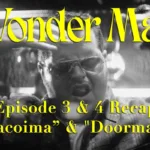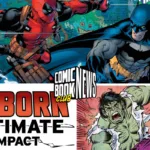A lot is going on in James Gunn’s new Superman movie, from the introduction of a new superhero universe (the DCU), to multiple superheroes, to the plot involving – spoilers past this point – Lex Luthor (Nicholas Hoult) attempting to kill Superman (David Corenswet) with an out-of-control portal between worlds. But in the midst of that, at least one real-world question has reared its head: is Superman about the Israeli-Palestinian conflict? And the definitive answer is: sure, maybe?
To give a bit more context here, as the movie opens, we’re told that “3 days ago,” Superman stopped the invasion of the country of Jarhanpur by the nation of Boravia. A conversation between Lois Lane (Rachel Brosnahan) and Superman explains further – without any real details – that Jarhanpur has significant problems as a country, but Boravia and its President Vasil Ghurkos (Zlatko Burić) are worse. What was most important to Superman, while Lois drilled into him about how the conflict was too complicated to get involved in? “People were going to die!” yells the Man of Steel, frustrated.
We get to see much more about Ghurkos, including his alliance with Luthor to manipulate the conflict and take Superman off the board. The goal is to take over Jarhanpur and split it between the two of them… Ghurkos will get a New Boravia, while Luthor will get a country of his own where he can be king. And we get to see more of Jarhanpur as well, or at least the border where the salt of the Earth people, who seem to be at least 50% children, are trying to hold strong against the American-supported troops of Boravia. We’re told they’re both bad countries, but the movie certainly skews your sentiments in one direction. It’s not towards Boravia.
If you remove all other details about this, could it be a metaphor for Israel and Palestine? People on social media certainly have made the connection, comparing Ghurkos to Israel’s Prime Minister Benjamin Netanyahu, Boravia to American ally Israel, and the conflict in Jarhanpur to Gaza. There are also many people on TikTok pointing out the difference between Superman, which finds Hawkgirl (Isabela Merced) dropping Ghurkos to his death, which they take as an explicitly political statement, versus Marvel’s Captain America: Brave New World, which jettisoned nearly every political detail from a plot that previously had more explicit ties with Israel thanks to the character of Sabra (Shira Haas).
But I digress. The issue is that Superman is not explicitly about Israel versus Palestine because this movie, too, jumbles things up in a way where the bean counters at Warner Bros. Discovery don’t have to get nervous about DC Studios entering the most divisive conflict of our lifetimes.

First of all, both Boravia and Jarhanpur are fictional. They’re locations straight out of DC Comics, and in fact, in 1939’s Superman #2, the hero got involved in stopping a civil war in the country of Boravia. It showed up later in 1958’s Blackhawk #126, where the titular hero overthrew a usurper and restored the rightful King to the Boravian throne. But – and here’s the key detail, which stays consistent with Superman: Boravia is located in Europe. Specifically, the Alps.
Jarhanpur, meanwhile, was introduced in 2002’s JLA #62, and is one of those ancient, mystical cities that have secretly existed for thousands of years that litter fictional universes like DC Comics. While the location isn’t known, the culture seems to lean more towards a mix of India and a touch of Middle Eastern culture. Basically: magical and unspecified ethnicity. In Superman, we only get to see the border, and while it could be Middle Eastern, it also could be anywhere else (Markovia, another fictional DC Comics European country, is located to the North). Of note, actor Fahim Fazli thanked James Gunn for casting him as “Jarhanpurian Villager Leader,” and added that he is “the first Afghan-born American actor in Hollywood in a Superman film.”
To further complicate things, it’s a conflict manipulated by a tech billionaire who is also manipulating social media and the US government (that would be Lex Luthor). You can choose your poison here, but the reference to a billionaire with a bunch of tech-obsessed acolytes, mentioned by Lois Lane later in the movie, has certainly rung the Elon Musk alarm online.

So basically, what we have here in the movie is an Eastern European country bordering a possibly Middle Eastern country, in conflict with each other. This could be a rough metaphor for the Israeli-Palestinian conflict. But you could also see it as Russia’s invasion of Ukraine, the United States’ invasion of Afghanistan, or any number of global conflicts that have erupted over the past century. In fact, if anything, that’s the idea of the movie: what happens when Superman gets involved in a complicated global conflict; not to point to anything in particular in the real world. And to extrapolate further, it’s more about what good people do in light of atrocities being committed both at home and abroad. So if to you that atrocity is Israel and Palestine, or Russia and Ukraine, or Elon Musk cutting funding to US AID… Sure, you’re right.
At least a bit of the reason for this mushiness of metaphor is that Gunn was first offered Superman back in 2018, hired to write it in 2022, and began principal photography in February of 2024. Also – you may be aware – the movie came out on July 12, 2025. That’s at least three years, though likely longer, that Gunn has been thinking about his take on Superman. Meaning it’s not about anything specific because by the time they got around to releasing the movie, it wouldn’t be about current events anymore… Despite the Israeli-Palestinian conflict having existed for far longer, and the most recent inciting incident happening on October 7, 2023, before Gunn began filming Superman.
But because of that timeline, the great news is you can read into Superman however you want. If you do explicitly see it as about a current conflict in the real world, like what’s happening right now in Gaza, sure, that’s what it’s about. If you don’t, and want to look at it as a general call to goodness with no specific analogue, then yes, that’s what it is as well.
Personally? I found this to be a weakness in the movie, that by trying to be about everything at the same time, it ultimately was about nothing. I wish it were more explicitly about what’s happening in Gaza, or what Russia is doing to Ukraine, or any number of other global conflicts, rather than a melange of ideas that add up to “be good” – a sweet message on greeting cards, but more frustrating than inspiring when you know a company has spent at least $225 million on a movie that could have been put towards feeding dying children. Again, I understand the schedule of making a movie, as well as the general politics of a massive company like Warner Bros. Discovery, won’t allow for that. But contrast that with, say, children’s superstar Ms. Rachel, who has doggedly used her massive platform to promote both “be good” and dive directly into the atrocities being committed in Gaza through her lens of supporting children, despite massive criticism online and off.
But that’s my take on it. And yours, like with all of art, is equally valid. Superman is, and has always been, a warrior for the little guy from his very beginnings in Action Comics #1. He’s associated with “truth, justice, and the American way,” but if you look back at page 1 of Siegel and Shuster’s classic, the first reveal of the character in costume states, “Superman! Champion of the oppressed, the physical marvel who had sworn to devote his existence to helping those in need!” It has nothing to do with America or any global conflict, but only that he helps people who need his help. That’s certainly what he does in Superman. But whether James Gunn is saying the movie is about specific sections of the world where people are in need, like in the Middle East? That’s up to you.
Listen to Sons Of A Gunn:
Discover more from Comic Book Club
Subscribe to get the latest posts sent to your email.











Fair, balanced, and neither dismissive nor condescending. Thanks for the overview. I hope people moved by the film decide to donate a ticket price worth of money to Gaza.
Thank you! Really appreciate your even-handed comment right back!
Upon first blush, I saw this article as a bit of a cop-out, however upon rereading I realized that’s not the fault of the article, but of the film it’s discussing. Superman doesn’t go very in depth with its criticism of anything, it’s very wishy-washy. Like you said though, it is quite difficult to get anything past censors, especially when those censors are a corporation like Warner Brothers that is interested in making money, not so much a serious statement on world events that might cost them money. When you really look at it, Boravia is a white, European country. Yes, it is modeled after Slavic nations (we quite literally see what appears to be St. Basil’s Cathedral in the background during one scene, though it is notably devoid of color) but Jarhanpur is notably an Arab nation which Boravia is invading and slaughtering its population with colonial aims to annex territory into their own borders. Vasil Ghurkos also looks very similar to David Ben-Gurion, and directly commands his military to spill the blood of every Jarhanpurian. I don’t think there’s any other real way to read that outside of being representative of the Gaza genocide. The secession of territory to Lex Luthor could also be analyzed as a representation of Donald Trump’s plans to rebuild Gaza now that Israel has leveled it near completely. Nothing in this movie is a one-to-one comparison, but the same could be said about movies that criticized the Bush admin 20 years ago like Revenge of the Sith and V for Vendetta. Neither of these films were direct analogues, they had in-universe representations whose meanings were meant to be extrapolated by the audience. Superman is another Revenge of the Sith or V for Vendetta, but I do agree with you that I wish the movie was more heavy handed with the messaging. It successfully managed to anger Israelis but there’s a good chunk of the population that only saw it as a superhero movie with no real messaging beyond “Superman is really cool” and I feel like if Gunn was allowed to double down on the message of the movie, people wouldn’t be able to, intentionally or not, disregard the meaning of the film.